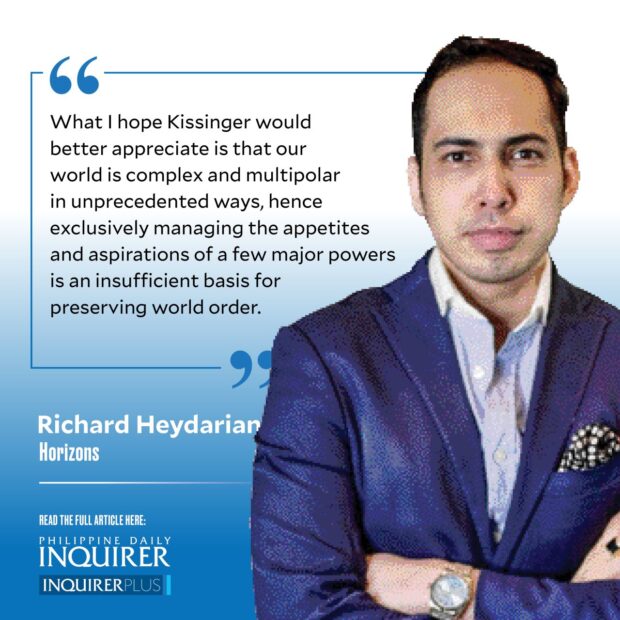New World Order: Conversing with Kissinger
 Earlier this year, I had the opportunity to exchange views with one of the most consequential statesmen of the 20th century: Henry Kissinger. So on the cusp of his 100th birthday, I initially thought of posting something online about his ideas and legacy which have left a huge imprint on our contemporary international order. It soon became clear, however, that writing a few lines on social media platforms wasn’t optimal, precisely because of the heavily polarized discourse on the former statesman’s multifarious legacy.
Earlier this year, I had the opportunity to exchange views with one of the most consequential statesmen of the 20th century: Henry Kissinger. So on the cusp of his 100th birthday, I initially thought of posting something online about his ideas and legacy which have left a huge imprint on our contemporary international order. It soon became clear, however, that writing a few lines on social media platforms wasn’t optimal, precisely because of the heavily polarized discourse on the former statesman’s multifarious legacy.
Surviving the horrors of Nazi Germany, and later fighting against the fascist regime as an American soldier, Kissinger’s life has spanned some of the most harrowing episodes in human history. As an academic-turned-diplomat in later life, he played a singularly pivotal role in shaping the balance of power among the main protagonists of the Cold War era — and, by extension, the lives of billions in the post-colonial world. Therefore, I thought it best to pen a proper yet succinct column on the matter.
To be clear, he was not the first consequential yet controversial “elder statesman” that I had the chance to trade ideas with. A few years earlier, I had an almost hour-long interview with the legendary Malaysian Prime Minister Mahathir Mohamad, who is also nearing his centenary. Not to mention, sharing a bizarrely spirited panel with former defense minister Juan Ponce Enrile, who repeatedly interrupted my analytic interventions until I was forced to draw the line. In short, I never shied away from complex characters, especially those with political tenacity and intellectual heft. It goes without saying that Kissinger, who was at the heart of American foreign policy during the most turbulent post-war years, has his share of passionate critics. Just days before his 100th birthday, I saw many progressive colleagues expressing very strong views on Kissinger’s role in the twilight years of the Second Indo-China War. Perhaps his most ardent critic was Christopher Hitchens, who accused the former diplomat of committing war crimes and chronicled the human impact of American foreign policy on the lives of countless folks across the post-colonial world, from Chile to Cambodia and Laos.
Lesser known, however, is the role of Kissinger in shaping the fate of the United States-Philippine alliance in the context of the South China Sea disputes. In a declassified diplomatic cable in the early 1970s, he argued “there are substantial doubts that [Philippine] military contingent on island in the Spratly group would come within protection of (MDT) (Mutual Defense Treaty),” since “[Philippine] occupation could hardly be termed uncontested in face of claims and protests of Chinese and Vietnamese.” The Kissinger position would be adopted not only by President Richard Nixon but all the way to the Barack Obama administration, thus affecting Washington’s response to the Mischief Reef and Scarborough Shoal crises in the post-Cold War era.
Those who have personally known Kissinger have been quick to emphasize the other dimensions of his legacy. For instance, his former student and current Harvard professor Graham Allison has maintained that the animating spirit behind Kissinger’s lifelong work is “the moral idealism of realism,” which is “not just about advancing one state’s interests, but [also] about the construction of a viable [international] order among the major stakeholders” in order to “preven[t] catastrophic war.” It’s a sentiment echoed by Kissinger’s son, David, who has argued that one of the main “secret[s] to my father’s endurance is his sense of mission. Although he has been caricatured as a cold realist, he is anything but dispassionate … ”
My exchanges with Kissinger were off-the-record. What I can say, though, is that he, indeed, has “unquenchable curiosity” and remains thoroughly “intellectually engaged” with the biggest questions of our era, from the troubling trajectory of great power relations to the mindboggling consequences of artificial intelligence in human civilization. What I hope Kissinger would better appreciate is that our world is complex and multipolar in unprecedented ways, hence exclusively managing the appetites and aspirations of a few major powers is an insufficient basis for preserving world order. And no longer can we rely on a committee of a few wise men to manage global affairs. Any effective “realpolitik” in the 21st century will have to contend with an extremely fluid, chaotic but also encouragingly more egalitarian world, where the future of humanity will be decided by a contest among a thousand voices.




















